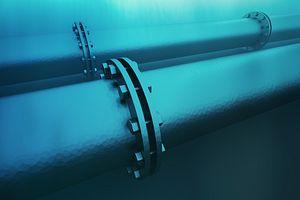On Friday, India opened formal talks on a deep-sea gas pipeline with both Iran and Oman. Indian Foreign Minister Salman Khrushid met Omani Foreign Minister Yousif bin Alawai bin Abdullah and Iranian Foreign Minister Javad Zarif. The project, which is being discussed for the first time at this high of a level, is expected to cost around $5 billion. The deep sea pipeline would be an alternative for India to the proposed Iran-Pakistan-India gas pipeline which ran into several complications after Pakistan failed to meet its obligations in a timely manner.
According to India’s Hindustan Times, the pipeline would be mutually advantageous for Iran and India, with the former having a massive surplus of gas and the latter having high energy needs. India imports around 75 percent of its crude oil. According to Iran’s PressTV, the Iran-Oman-India pipeline would source its gas from Iran’s South Pars oil and gas field which is located in the Persian Gulf. The pipeline would run around 1,400 kilometers.
In December 2013, reports emerged that an Indian firm had conducted feasibility studies for the proposed deep sea pipeline route with favorable results. The cost estimate by India’s South Asia Gas Enterprise Pvt. Ltd. (SAGE) was around $4-5 billion. The pipeline is expected to carry 31 million cubic meters of gas per day. Also in December, the marketing manager for Iran’s National Iranian Gas Exports Co. said that that “Negotiations were held with three Indian companies for [their] purchase of gas from Iran, and general agreements have been reached,” referring to gas that would be delivered via this pipeline.
Should India and Iran move ahead with the deep sea pipeline plan, the future of the land-based pipeline which was intended to channel gas from Iran via Pakistan appears increasingly uncertain. In December 2013, as Iran demonstrated additional interest in pursuing the deep sea pipeline project with India, it cancelled a major $500 billion loan to Pakistan for the construction of the land-based pipeline, all but ensuring that Pakistan would fail to meet its winter 2014 deadline for completing its portion of the pipeline.
Part of the reason Iran denied Pakistan the loan for the land-based pipeline was due to a crunch in government finances owing to biting Western sanctions over its nuclear program. Currently, Iran and the P5+1 group of states (including the United States, Russia, China, France, Germany, and the UK) are engaged in an interim deal that offers Iran limited sanctions relief. A more permanent deal would lift additional sanctions and untie the Iranian government’s hands fiscally, allowing it to move forward with projects such as these proposed pipelines.
A deal on the pipeline would increase India’s stakes in Iran successfully navigating its current diplomatic situation with the P5+1, which would allow it to move towards greater normalization. India, with its investment in Iran’s strategically important Chabahar port and dependence on Iranian crude, already has a vested interest in Western sanctions being lifted.

































